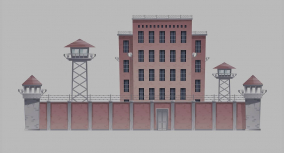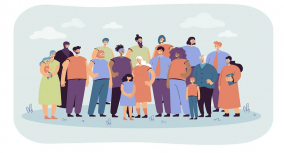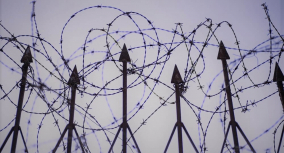Symbolism in Night by Elie Wiesel is a key device used to express the memoir’s themes. The book, first published in English in 1960, is based on Wiesel’s experiences in Auschwitz and Buchenwald and highlights the horrors of the Holocaust. The most potent symbols in Night are fire and night itself, each laden with deep meaning.
To better understand what night symbolizes in the book Night and how fire contributes to the composition, explore this short analysis made by Custom-writing.com experts. You will find out how insightfully Elie Wiesel depicts destruction and death, despair, and the absence of God. Additionally, quotes about night and fire in Night with chapter numbers and detailed interpretations of their symbolism will help you uncover the deeper layers of Wiesel’s work.
🔥 What Does Fire Symbolize in Night by Elie Wiesel?
Fire is one of the two main symbols in the book Night. It represents destruction and inhuman cruelty and can be seen as a subversion of the traditional meaning of this element.
In the Bible, for example, fire represents hope and faith. God appears to Moses as a burning bush and leads the Israelites out of Egypt through pillars of fire in Exodus. In this context, flame serves as a force that purifies and erases evil – the opposite of the symbol’s meaning in Night.
In Wiesel’s novel, the readers first meet this symbol when the Jews are riding on a train to Auschwitz. Being exhausted, people start acting inadequately. One of the imprisoned, Madame Schächter, goes mad as she sees a blaze from the window. She starts screaming about the upcoming death. Yet, nobody takes her seriously, assuming that the woman is just out of her mind. The author uses the technique of foreshadowing here. Madame Schächter’s hysteria was the first sign of the forthcoming tortures.
Then, the symbol of fire becomes even more frightening. As the victims of the holocaust arrive at the concentration camp, the first thing they notice is the terrible smell of burning flesh. Here, Jews realize that they are under the constant threat of being killed.
Eliezer’s mother and sisters become victims of the fire at the beginning of the story. Being females, they simply do not pass the selection. They are sent to the crematorium and burnt alive. So, Elie Wiesel illustrates the fire as a symbol Nazi authority and dictatorship.
Being in a concentration camp, Eliezer continually feels the presence of death. He is surrounded by numerous crematoriums where more and more people are burnt from day to day. Witnessing deadly tortures, Eliezer loses his faith. The fear of being burnt alive consumes him. Thus, for him, as for the rest of the Jews, the fire is a symbol of merciless death.
Fire becomes even a more dramatic symbol, as the author illustrates the vicious burning of children in the crematoriums. Elie Wiesel highlights that even infants were executed. Those tiny innocent human beings, whose lives were about to start flourishing, ended up being killed by the destructive force of flames. So, the fire devastates everything on its way, not even leaving a chance to repair the damage.
Overall, fire creates a hell on earth. The author draws a sharp line between his book and the Bible. Fire as a symbol of in Night completely differs from what flames represent in the Bible. For the main character, a fire symbolizes death, lost faith, and disbelief in God’s justice. Moreover, the devastating force of flames equates with the destructive dictatorship of Nazis. Just like fire demolishes everything alive on its way, Nazis don’t leave a chance for survival to the imprisoned Jews.
Quotes About Fire in Night with Chapter Numbers
The stars were only sparks of the fire which devoured us. Should that fire die out one day, there would be nothing left in the sky but dead stars, dead eyes.
Night, Eliezer Wiesel, Chapter 1
It was Mrs. Schächter. Standing in the middle of the car, in the faint light filtering through the windows, she looked like a withered tree in a field of wheat. She was howling, pointing through the window: “Look! Look at this fire! This terrible fire! Have mercy on me!”
Night, Eliezer Wiesel, Chapter 2
In front of us, those flames. In the air, the smell of burning flesh. It must have been around midnight. We had arrived. In Birkenau.
Night, Eliezer Wiesel, Chapter 2
Not far from us, flames, huge flames, were rising from a ditch. Something was being burned there. A truck drew close and unloaded its hold: small children. Babies! Yes, I did see this, with my own eyes… children thrown into the flames. (Is it any wonder that ever since then, sleep tends to elude me?)
Night, Eliezer Wiesel, Chapter 3
Never shall I forget that smoke.
Night, Eliezer Wiesel, Chapter 3
Never shall I forget the small faces of the children whose bodies I saw transformed into smoke under a silent sky.
Never shall I forget those flames that consumed my faith forever.
[…]
Never shall I forget those things, even were I condemned to live as long as God Himself.
Never.
🌃 What Does Night Symbolize in the Book Night?
For the fire, the author comes up with quite an unexpected interpretation. Instead of portraying it as a divine force for erasing evil, Wiesel depicts it as a symbol of death. However, there is nothing unusual in the meaning of the night. So, what does night symbolize in the book? Let’s figure it out!
The most horrible events that ever happened to Eliezer occur at night. To remind you what are they:
- the news that the Jews of Sighet will be deported come at night;
- the boy first enters a concentration camp at night;
- the march of death begins at night;
- Eliezer’s father is perceived as dead and taken away at night.
As all these events occur, the main character is overwhelmed with fear and despair. Every time darkness covers the concentration camp, Eliezer and the rest of deported Jews feel the evil of the night. They realize that they are weak and defenseless, and nobody can help them except for themselves. Therefore, the night is a symbol of horror and helplessness.
Moreover, Elie Wiesel interprets the night from a religious perspective. In the Bible, when the Lord came on earth, there was total darkness. The first thing God created was the light. Then, with the light, life came on the earth.
As a deeply religious person, Eliezer believes in God’s divine power at the beginning of the story. For him, the light symbolizes the Lord’s presence, while the darkness means His absence. With the development of the plot, the boy continuously loses his faith. He witnesses inhuman tortures and questions God’s justice and kindness. The boy cannot realize how God allowed this hell on earth.
Eliezer’s despair significantly strengthens during the night when he vividly sees the bright flames from the crematories’ chimneys. The darkness covers him with feelings of fear and lost faith. Thus, the night is a symbol of uncertainty and God’s absence from the religious point of view.
Overall, the night is not just the book’s title. It is a powerful symbol that helps the readers grasp the memoir’s key idea and understand it deeper. The night’s symbolism has a double meaning. Firstly, it reflects the feeling of the immense horror the imprisoned Jews experienced in the concentration camps. Secondly, the night symbolizes the absence of God and Eliezer’s lost faith in the kindness and justice of the Lord.
Quotes about Night with Chapter Numbers
Night. No one prayed, so that the night would pass quickly.
Night, Eliezer Wiesel, Chapter 1
The night was pitch-black. From time to time, a shot exploded in the darkness. They had orders to shoot anyone who could not sustain the pace. Their fingers on the triggers, they did not deprive themselves of the pleasure. If one of us stopped for a second, a quick shot eliminated the filthy dog.
Night, Eliezer Wiesel, Chapter 6
Pressed tightly against one another, in an effort to resist the cold, our heads empty and heavy, our brains a whirlwind of decaying memories. Our minds numb with indifference. Here or elsewhere, what did it matter? Die today or tomorrow, or later? The night was growing longer, never-ending.
Night, Eliezer Wiesel, Chapter 7
We were given no food. We lived on snow; it took the place of bread. The days were like nights, and the nights left the dregs of their darkness in our souls.
Night, Eliezer Wiesel, Chapter 7












Fire could also represent power (but negatively)